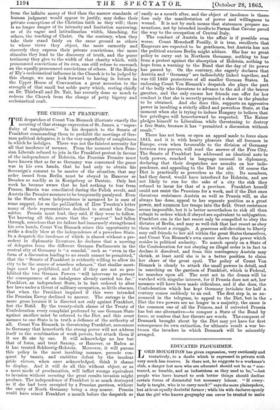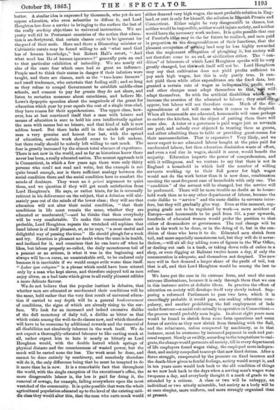EDUCATED PLOUGHMEN.
LORD HOUGHTON has given expression, very cautiously and tentatively, to a doubt which is expressed in private with very much less reserve. Is there not, he suggests to a workman's club, a danger lest men who are educated should not be as "con- tented, as humble, and as industrious as they used to be,"—lest people who have learned to seek better things should decline certain forms of distasteful but necessary labour. "If every- body is taught, who is to carry muck?" says the more plainspoken, but at least equally doubtful farmer; while his wife declares openly that the girl who knows geography can never be trusted to make butter. A similar idea is expressed by thousands, who yet do not oppose education, who even subscribe to diffuse it, and Lord Houghton has done a servics in bringing to the surface the last of the really working objections to universal instruction. We are pretty well rid in Protestant countries of the notion that educa- tion is un-Scriptural, that certain classes ought to be ignorant for the good of their souls. Here and there a Dissenting minister or Calvinistic curate may be found willing to ask "what need God has of human knowledge," but Robert Hall's retort, And what need has He of human ignorance?" generally puts an end to that particular exhibition of imbecility. We are nearly rid also of the caste fear which once had so great an influence. People used to think their status in danger if their inferiors were taught, and there are classes, such as the "two-horse farmers" and small tradesmen, who entertain that feeling still ; and so long as they refuse to compel Government to establish middle-class schools, and consent to pay for grants they do not share, and listen to sectarian nonsense about catechisms, and believe Mr. Lowe's dyspeptic speeches about the magnitude of the grant for education which year by year equals the cost of a single iron-clad, they have reason fiir their apprehensions. The upper class, how- ever, has at last convinced itself that a man with leisure and means of education is sure to hold his own intellectually against the man with means but no leisure, and that kind of talk is now seldom heard. But there lurks still in the minds of practical men a very genuine and honest fear lest, with the spread of education, certain work should come to be left undone, lest there really should be nobody left willing to cart muck. The fear is greatly increased by the almost total absence of experience. There is not now in the world, and as far as historians know there never has been, a really educated nation. The nearest approach to it is Connecticut, in which a few years ago there were only thirty persons who coull not read and write, but the example is not quite broad enough, nor is there sufficient analogy between the social condition there and the social condition here to comfort the minds of doubters. They want an a priori argument to quiet them, and we question if they will get much satisfaction from Lord Houghton's. He says, or rather hints, for he is unusually reticent in his deliverance on the subject, that a delusion will ulti- mately- pass out of the minds of the lower class ; they will see that education will not alter their social condition, "that their conditions in life must remain the same, whether they are educated or uneducated,"—and he thinks that then everybody will be very comfortable. To make this consummation more probable, Lord Houghton repeats the wretched old sophism that hand labour is of itself pleasant, or, as he says, "a most useful and delightful way of passing the time." He should plough for a week and try. Exertion is pleasant no doubt when the man is in health, and inclined for it, and conscious that he can leave off when he likes, but labour properly so-called, the daily monotonous toil of a peasant or an artisan, is what it was in the beginning and always will be—a curse, an unmistakable evil, to be endured only because it is inevitable if we would escape evils worse than itself. "Labor ipse voluptas" is a phrase which could have been uttered only by a man who kept slaves, and therefore enjoyed toil as men enjoy olives, as a bad taste which gives to all really pleasant edibles a more delicate flavour.
We do not believe that the popular instinct is delusive, that whether men are educated or uneducated their conditions will be the same, hold rather that the very first result of universal educa- tion if carried to any depth will be a general bouleversenzent of conditions, the signs of which are already rising to the sur- face. We look for an increased and indeed excessive dislike of the dull monotony of daily toil, a dislike as bitter as that which exists among the well-to-do classes now, and which therefore will have to be overcome by additional rewards and the removal of all disabilities not absolutely inherent in the work itself. We do not expect a thoroughly-educated labourer to like carting muck at all, rather expect him to hate it nearly as bitterly as Lord Houghton would, with the double hatred which springs of physical distaste and the consciousness of wasted power, but the muck will be carted none the less. The work must be done, and cannot be done entirely by machinery, and somebody therefore will do it, the only difference being that he must be tempted to do it more than he is now. It is a remarkable fact that throughout the world, with the single exception of the executioner's office, the more disagreeable labour is, the less is paid for doing it, the removal of sewage, for example, falling everywhere upon the most wretched of the community. It is quite possible that were the whole agricultural population educated up to the level of the existing mid- dle claw they would alter this, that the man wh9 carts muck would either demand very high wages, the most probable solution in Eng- land, or cart it only for himself, the solution in lquiniah Prussia and Connecticut. Either might be very disagreeabre to classes, but neither would be impossible, neither would injure society, and neither• would leave the necessary work undone. It is quite possible that one of Fourier% idmay in the far future be realized, and men paid in proportion to the disagreeableness of their functions, that the pleasant occupation of ening land may be less highly rewarded that the unpleasant onupation of ploughing it, but society will not therefore come to an end, or civilization either. The "con- dition" of labourers of which Lord Houghton speaks will be very greatly changed, but thtitirork itself will not be. Lord Houghton may say that cultivation does not yield profits sufficient to pay such high wages, but this is only partly true. It can- not yield them while other expenditures are the fixed data, but granted a certain rate of wages as indispensable, profit, rent, and other charges must adapt themselves to that, aiti will adapt themselves. So with the artificial disabilities which now increase the aversion of the educated to labour ; they must dia-ap appear, but labour will not therefore cease. Much of the dis- agreeableness of toil will cease when it ceases to be despised. When all housemaids are educated, housemaids will cease perhaps to endure the kitchen, but the object of putting them there will cease also. A tutor or a governess is paid wages just as servanta ate paid, and nobody ever objected to treating them as guests, and either admitting them to table or providing guest-rooms for their accommodation. That is expensive ? Very likely, and we never expect to see educated labour bought at the price paid for uneducated labour, but then education diminishes waste of effort, and even a real rise in wages, should it occur, would benefit the majority. Education imparts the power of comprehension, and with it willingness, and we venture to say that there is not in England a household in which half the number of willing servants working up to their full power for high wages would not do the work better than it is now done, combination meeting the most frequent case of households with only one. The " condition " of the servant will be changed, but the service will be performed. There will be more trouble no doubt as to house- hold work than as to any other department of labour, because the caste dislike to " service " and the caste dislike to servants inter- fere, but they will gradually give way. Even at this moment, sup- posing grade not to be regulated by work—a mere accident of Europe—and housemaids to be paid from 35/. a year upwards, hundreds of educated women would prefer the position to that either of dressmakers or governesses. The real change will be not in the work to be done, or in the doing of it, but in the con- dition of those who have it to do. Educated men shrink from toil, and more especially monotonous toil, but they will do it never- theless,—will sit all day adding rows of figures in the War Office, or dealing out cash in a bank, or taking down rolls of calico in. a shop, or even digging at Ballarat twelve hours a day, if only the - remuneration is adequate, and themselves not despised. The new-- race will in fact demand a larger share of the profit of toil, but - that is all, and that Lord Houghton would be among the last tot refuse.
We have put the case in its extreme form, and used the most extreme illustrations, because it is only through them that we can in this instance arrive at definite ideas. In practice the effect of education on society will develope itself very slowly indeed. Sup- posing a reformed Parliament to pass two laws, which it is exceedingly probable it would pass, one making education com-
pulsory, and another prohibiting the full employment of lads under fourteen—a social rule actually in operation in Connecticut—
the process would probably soon begin. In about eight years men would be found to shrink from some farm operations and some forms of service as they now shrink from thrashing with the flail, and the reluctance, unless conquered by machinery, as in that instance, must be overcome by increased payment in cash and per- sonal respect. Slowly or swiftly, according to the temptations to emi- grate, the change would permeate all society, till in every department of life employers found wages rising, the employed more indepen- dent, and society compelled to accept that new fixed datum. After a fierce struggle, exasperated by the pressure on fixed incomes and the death-blow given to feudal feelings, society would accept it, and in ten years more would look back to the old condition of things as we now look back to the days when a serving man's wages were
twopence a day, and everybody thought it a mark of grade to be attended by a retinue. A class or two will be unhappy, an
individual or two utterly miserable, but society as a body will be at once simpler, more uniform, and more strongly organised than at present.































 Previous page
Previous page